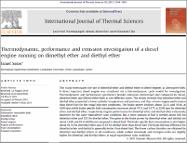Thermodynamic, performance and emission investigation of a diesel engine running on dimethyl ether and diethyl ether
Erişim
info:eu-repo/semantics/closedAccessTarih
2011Erişim
info:eu-repo/semantics/closedAccessÜst veri
Tüm öğe kaydını gösterÖzet
This study investigates the use of dimethyl ether and diethyl ether in diesel engines as alternative fuels. A direct injection diesel engine was simulated via a thermodynamic cycle model for investigation. Thermodynamic and performance parameters besides emissions determined and compared for diesel, dimethyl ether and diethyl ether fuels at two different states. The results showed that dimethyl ether and diethyl ether presented a lower cylinder temperature and pressure, and thus a lower engine performance than diesel fuel for the equal injection conditions. The brake power declines about 32.1% and 19.4% at 4200 rpm while brake specific fuel consumption increases about 47.1% and 24.7% at 2200 rpm for dimethyl ether and diethyl ether, respectively. Engine performance for dimethyl ether and diethyl ether extensively improves for the same equivalence ratio condition, but a more amount of fuel is needed about 64% for dimethyl ether and 32% for diethyl ether. The gains in the brake power by dimethyl ether and diethyl are about 13.6% and 6% at 4200 rpm compared to diesel fuel. The brake specific fuel consumption is also higher about 43.5% for dimethyl ether and 23.6% for diethyl ether than diesel fuel. The brake thermal efficiency for dimethyl ether and diethyl is generally better than diesel fuel. The lower carbon dioxides are obtained by dimethyl and diethyl ethers at all conditions, while carbon monoxide and nitrogen oxide are slightly higher for dimethyl and diethyl ethers at equal equivalence ratio condition. (C) 2011 Elsevier Masson SAS. All rights reserved.


















